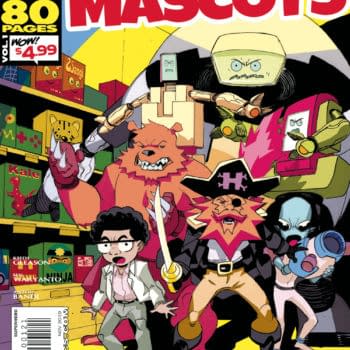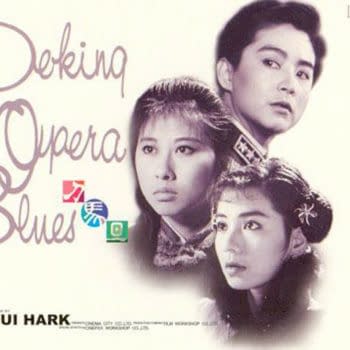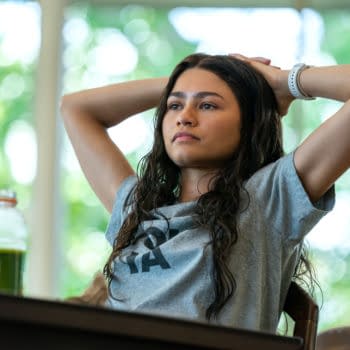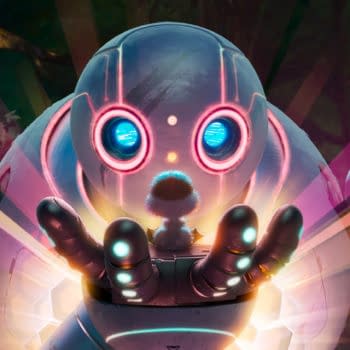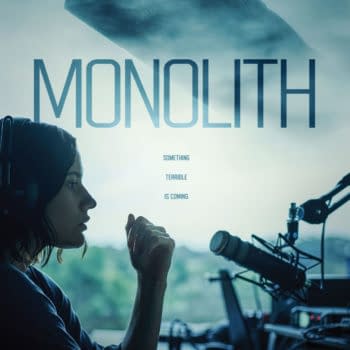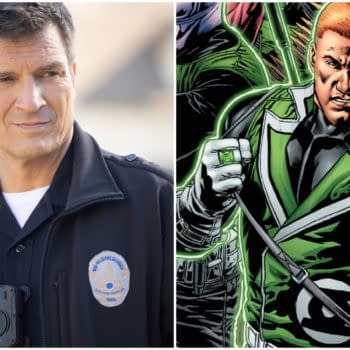Posted in: Movies, Recent Updates | Tagged: devil's double, dominic cooper, film, interview, lee tamahori, ludivine sagnier
Dominic Cooper On The Devil's Double, Captain America And Playing The Nasty
Dominic Cooper stars in the Devil's Doubl, alongside Ludivine Sagnier, Raad Rawi and… Dominic Cooper.It's the story of Saddam Hussein's son Uday, and the poor man made to be his decoy double. A lot of the fun is in seeing Cooper vs. Cooper.
Hannah met one of the Coopers for a roundtable chat in London last week. Here's what went down.
Did you take two salaries from this film?
I did. [laughs] No.
It must have been daunting going into it, though?
Yeah, it was daunting but I think I'd been so positively active about getting the role and wanting it that by the time I did have it I was so excited about doing it and made sure that there was rehearsal time to make two very separated characters. I mean, it was daunting, the whole idea of it was daunting but from the moment I knew I was doing it, because I'd read it and because I'd actively chased it, I felt like there's no point being scared now, you've got to dive in and do what you can.
And I felt very confident and safe within what we'd come up with and how Lee Tamahori perceived the project and I think I had confidence in the fact that we weren't making something – it wasn't going to be a political statement, it wasn't going to be a biographically detailed account of events. I wasn't studying these two guys and then mimicking them or making a carbon copy of them, I was gaining an essence of who these people were and then I was creating two different characters, really. And that reassured me and also, yeah, it made it less daunting.
Actually, you've just got to come up with two very different characters and make it believable that you're two different people. That was what was very daunting. And the problems that arose were playing somebody that ultimately I despised – I could see no redeeming features about him and the more I unearthed about him, I was repulsed by him. Technically, it was going to be challenging – to act in a space when you don't have someone to react and respond to and therefore develop a scene.
And to keep our hero interesting, having worked out this rather cartoonish, ludicrous – although compelling, entertaining – disgusting figure, to keep the solid hero in the piece as interesting. So I suppose there was a lot to be quite daunted about, but for some reason I just – I almost didn't have time to think about it, the way in which we filmed it was just so intense and fast and I was jumping between the two so sporadically, backwards and forwards, there wasn't really much time to fear it or to question it or to worry, really.
You say no redeeming features, but a lot of actors will say that even when they're playing Hitler, they've got to find something. Was there really nothing about Uday at all?
No, I had to – I thought, 'Well, let's make him a child', a lost kind of little boy and I thought, 'So what are his relationships? What has he experienced? Why is he like this?' and I needed to find out something so I could look through the eyes of the man and get under the skin of him and inhabit him and be him and try and find where that bile and aggression and pure hatred towards the rest of humanity comes from, so I just thought about his relationship with his father, having this all-powerful figure in his life who is all-powerful to the rest of the world and how Saddam, I don't think, paid him any real
attention and actually thought he was a bit of a moron, really. He didn't give him any huge responsibility within the regime, he certainly didn't want to hand him the reigns of power after he stepped down and I think that's humiliating to someone of that culture, to not step into the shoes as an eldest son of your father's.
That gave me some indication of some pent-up related aggression towards a domineering father and his love of his mother gave him a sort of essence of humanity and his hating his father's treatment of his mother. And his exposure to scenes of horrific violence and torture when he was a young man, which Latif says happened to him. His father would show him films of torture when he was four, so those kind of ideas, in that vein I then found something that I could kind of – at least gave me some indication of a human being, which was not what I was getting from researching his crazed antics, really. But yes, it's true, you do need to – and finding the comedy of him, what he laughs at and actually, how the sort of drug fuelled and alcohol fuelled chaos of his life was about how he's not being able to deal with some of the things he's done.
You see sometimes, I hope, in the film, flashes of him actually, for a moment, considering the horrors that he's caused and I think for a moment, if he'd stopped and reflected he would have had a breakdown. He was a psychotic maniac. He was a madman. He was actually mad.
You said you were sporadically going between the two characters. Was that difficult? Were you given a bit of time to snap between the two?
Yeah, not really, no. Literally, the logistics of how it worked technically were, we would film a scene, first of all, and if they
were both in the scene, you'd film something on a motion-control camera that ran on a track and had a moving head so that it could replicate its moves exactly and therefore I'd do Uday once, do that move and then I'd run off, change and step in as Latif and the camera would repeat the move and then you could paste the two images over one another and the two figures were in that. And that became difficult when there was any contact between the two because it wouldn't work,
if that makes sense, so therefore we had to use head replacement whenever they contacted one another, so that's the basics of how that worked. What that meant was that I'd always ask to be Uday first, because he was more exhausting and it took more energy to be him and he was more dynamic within the scene and he was often the creator of the architecture of the scene, how it worked, how it played out. Because I didn't know what Latif was going to do yet, I mean, you don't know until you're on set and you've worked it out, so I'd often play that without knowing how Latif was yet reacting or where he'd be
and I was having to guess that there and then. Then Lee would have to choose a particular take so that I could have an ear-piece of my performance in my ear so that when I ran off and got back into Latif mode, I could just be reacting and responding to my dialogue in my ear. So it was all about kind of remembering and then guessing or remembering where the eye-lines were, because if they're out by a centimetre the whole scene doesn't work. So I literally didn't have a minute's thought to prepare, apart from getting changed, which is where you're getting poked and prodded and pulled and sort of spoken to. But it was a gift in a way, because again, you just didn't have time to ponder too much upon it and again, I felt like I'd established the basics of who these men were. And then I was at liberty to do what I pleased and I discovered lots of things along the way, but like you say, the physical presence of each of the men, that was all decided early on and the vocal range and the choice of syntax and how they spoke and the space that they took up, their mannerisms, they were all
decided upon so that I could sort of just flick into that mode and feel comfortable within the body of who I was performing and therefore it was just about getting into the mind-set. And they felt to me like they both operated from completely different spaces in my brain. When doing either one, there was never a case of me getting mixed up – "Hold on, who am I?" – I always felt very different as either guy.
How much time did you get with the real Latif?
I spent about five hours with him when I first got the part, him and Lee, we sat in this strange hotel in London and after we had decided – even in the audition, I spoke to Lee at length about the fact that we should just be creating two characters – I know that one is here and one existed and we can get as much information on him as we like, but when I knew that this wasn't a biographical, detailed account of either man, that I didn't necessarily need to sit this man down and grill him about everything about his life. I don't know whether you've met him today already but he's a huge physical presence and he's
scarred, mentally and physically from the incidents that have happened not too long ago – I mean, it's not, if you think about it. And it's so hard for any of us to really understand what that means, to have your life – to lose your family and your home and to live through that nightmare. And I suddenly thought, 'Well, I'll sit with him and I'll talk with him but I'll just let him tell me about whatever he wants to talk to me about, really'. I just suddenly felt like it wasn't my place to start scrutinising him. And he would tell me whatever he liked – I think in the first – what did he say to me first? The first thing he said to me was, "I know if I like somebody within the first 30 seconds of meeting them…" Mildly terrifying.
Did he tell you anything in person that you would have liked to have incorporated into the film but you weren't able to?
The thing is that the horrors of what went on are so unbelievable, like we toned down a lot of stuff in the film, a lot of
the…austerity, is that the word? Like, Uday's taste and choices in things, it's so ludicrous and I think the crimes that he committed, that it's hard for us – so I think they chose very well what to have in. And I was always aware from the beginning that we were absolutely manipulating the truth, we were never telling – it was never meant to be a political rant or a statement about that moment in time, so we could have included more stuff but there was nothing I can think of that he mentioned to me that should be added. You know, the film was the film and I didn't want to interfere with that. I thought it worked very well, the structure worked well, we had a very – it was quite a simple – we had a hero and a villain, really. I just wanted to get an essence of who he was and let him tell me about Uday – it was the only real information that you could get about Uday, apart from images on YouTube, which I loved looking at, which I found kind of compelling, watching that stuff.
What was the hardest scene to film as Uday?
To feel emotionally connected to without despising who I was playing? Yeah, I found the wedding scene really traumatic. I found that scene really moving, because it's that complete abuse of power and actually seeing the happiest day of someone's life being turned into the most despicably depressing day of one's life, I found that really hard. I found that hard emotionally. I think, yeah, it probably was that. To be honest, I relished all the scenes – I know that sounds terrible when you're playing such a despicable person but I was so kind of obsessed with the technical side of it and how to get these two characters across – I was so engrossed in the whole process of it that I kind of took each scene and relished it, really and chatted with Lee at length about it and was just so excited about how on earth it was going to work. I mean, they were all difficult. And I didn't know what it was that I was necessarily doing, I just believed in Lee, to be able to be guiding me and steering me in the right way, because we always seemed to be on the same page about who these guys should be and what the
story is. The difficulty of scenes really became more about the technicalities and the frustration of the technical side of it more than the emotional side of it. I was just playing a villain and a monster and I hated him but I was accessing his emotions on some level but it was thrilling to play him and to have that freedom in a space to go as manic as I pleased, because that's what he was like, without anyone sort of slowing him down or stopping him because everyone feared him. He was all-powerful and it felt like that performing it as well and I feel like that was the right feeling to be experiencing.
On a similar note, do you have a favourite scene?
That I remember doing and feeling good about doing? Those scenes often that you think often are the worst, with this… the anger, the anger of the party, when they're all drinking and this man, who he has hated all his life… his father's best friend, he suddenly takes it all out on him. Not where he's slashing his bits up but the early part of filming that scene has this good monologue in there that he kind of reels off. Michael's scripts are so precise… they're sparse, which allows room to just kind of go off on tangents on your own with the character of Uday. You couldn't do that with Latif. But I think that was pretty fun. It's great when you access it, you feel like you may be hitting it and getting it right. You let yourself go, really, with
it.
How does Latif describe Uday? Can he see any shred of humanity or struggle in him?
No, he hates him. He hates him. He changed his life and ruined his life.
Did you go from filming Captain America to Devil's Double or vice versa?
No, Devil's Double was completed. I think Captain America and My Week With Marilyn were directly after The Devil's Double…
So, in that sense, given that Devil's Double must have been emotionally draining, was it a relief then to go to something like Captain America?
No, I missed the challenge and the excitement of being in and amongst a film set every day and being part of the creative energy and the decision making and watching things unfold and change… to being on this suddenly very well oiled machine that was going to look incredible and be a fantastic movie. But you come in and you do your bit in the hope that you're getting it right for the millions of fans that have already got ideas of who this character should be, which is terrifying… more daunting than playing the two guys. I had a fantastic time doing it. I was in awe of it… it was like a little kid's dream to suddenly be flying a plane. Joe Johnston is incredible. Why I think that film looks so brilliant is this is someone's interpretation of the future in the past and everything about it was kind of magical and worked and operated. There were little tiny engines that were functioning within another engine within a box that was never going to be seen by the camera in a million years, but had been built. I was like: "Wow, that's incredible!" So, it was good and I loved it but it wasn't the same experience. It was a very, very different working experience.
How much preparation time or rehearsal did you get for The Devil's Double?
I think I went out to Malta a week before we started filming, maybe a week and a half, and we sat in a basement and went through the scenes and talked them all through and worked out how maybe they'd be filmed. We couldn't really establish how it was going to play out… everything was constantly so different and changing all the time because of the nature of the piece. But [there was] enough time to really identify with who I thought these people should be. The dialect coach was really helpful and stopped me being hung up on the accent and made it much more about the speech patterns. So, they were the
things that I worked on really – the physical presence of each man and how different that was. The vocal range being very different – anything I could do to define and separate. You can talk through scenes as much as you like but with a film like this you can over rehearse something. Sometimes it's better just to say: "Let's not go over this again, this is going to happen on the day and I'm just going to have to try and…" It's good to be looking for words or what you're saying… when you know it really, really well it's hard to make it fresh again or bring it back to a place of spontaneity that we have when we're talking.
When you see Uday on YouTube how do we know that it's him and not Latif?
We don't. It could be Latif… but I can tell which one's which in the photos. I don't know how they didn't. It's ludicrous. It's completely obvious, if you ask me.
So, the people around him and protecting him knew which one was which?
I'd say yeah. I don't think they looked enough alike in my opinion. I mean they looked very alike but you can see it in their eyes more than anything. One has a crazed mental look in his eyes and one looks passive.
Latif survived 11 assassination attempts, didn't he?
Something like that. Though I never know what's real and what's not.
What does Latif think of the film?
He loves it. I think he's very proud of it. I think it's very moving for him. I sat next to him in Berlin and watched it for the first time and it affected his breathing and he was very moved. You kind of remind yourself that he was reliving chunks of his life. But I just don't know what it would be like to see your life playing out in front of you. It must be extraordinary. But I think the story feels very different from his… they're not meant to be. I got an essence of him in his situation; it's not really meant to be him. I mean, did Uday really have those ridiculous… well he did have those ridiculous teeth but I'm sure he didn't have a high pitched cackle. I don't know and I don't really care… I never did care and I think that's what was good.
Have you kept the teeth?
I have kept the teeth. Girls love 'em [laughs].
How do you feel about awards talk?
It's very, very nice that anyone would even mention it and I'm very careful with what I say about it. Your reaction can be taken in so many different ways… I don't know, I love it… it's very nice. But these things arise and come up and then they vanish. So, I don't think there's any point in thinking [about it] for a second longer than when it's mentioned.
But do you read a script like this and have a sense…
Do you mean is it always in the back of your mind when you're doing it?
Possibly, yeah…
Um, I just gave myself that question! What a horrible thought [laughs]! But it's a good question. I think actors would lie if they didn't say that when they took something on they wanted to do it incredibly well. Often, the opportunity doesn't ever arise and it's really hard to bring a great deal into a character. This was an opportunity to show two hopefully very different characters but I think it's always best not to think about any of that stuff ever. But I think it would be a lie to say that actors don't ever think about it. There's always a joke about actors preparing their speeches and it's never going to happen. I don't know what I'm saying anymore…
Is it an actor's dream to play opposite a handsome leading man and then get to kiss him? Especially in this case as your fellow leading man is you? It's a bit Freudian…
Do I get to kiss him? Oh, I do… but that was actually someone else, believe it or not [laughs]. But you're never actually working with you. My experiences have only ever been of despising watching myself on screen when it comes up. It's really, really hard and your opinions are so low of yourself and you want to change what you've done and you can't and you don't believe it. You just don't believe the majority of the stuff because you see your tricks and you see what you're doing
and you know that you're acting. So, you watch stuff and say: "You're acting drinking from that cup! I don't believe you're actually drinking…" It's often the simplest stuff but you're so critical of yourself. So, it was daunting thinking of seeing myself on-screen twice… a lot, in one film. But I'm pleased with it for the first time ever in work that I've done. I'm pleased that I can decipher who is who in the film. There are still loads of moments in it where I wish I'd done other things but…
You were in two massive British hits of 2009 – Mamma Mia and An Education – so is this your way of striking out on your own and taking your career in a different direction?
I never set out to do that or tried to find something that could do that. It just came along. I just loved the idea of doing this
particular script. I thought it was a mesmerising story. But I suppose it is quite a good way of doing that, now I look at it. I always say this but it's true, people want to pigeon-hole you. So, it's exciting when you're given the opportunity to do something very different. Most actors can… that's what they do, they're meant to inhabit different people and portray themselves in a completely different way and be believable. That's the plan. So, to get the opportunity to do that is
great.
After playing such a monster, do you sigh a great sigh of relief and yearn to play an enchanted prince somewhere else? Or would you play someone similarly evil again?
I don't think it's just about whether it's evil… if the prince is very multi-layered and complex and has within it different levels of emotion and goes on a journey, then I'd love to play that person. But that's all it's about. I've been lucky that a lot of the roles have actually been people that existed and real-life people, which gives you automatically a huge amount of back story. Often that stuff, you're having to create that yourself – you're creating a past, a history and an identity for a character, and you can often misjudge it or make mistakes. You can often be unsure of your choices and when you're not sure, it's not firm grounding upon which to create a character. So, when they've got their own back story it's fantastic… you just look it up. You see: "Okay, those were his parents…" Or: "I see, he thought like that and he behaved in that way." It kind of does
half the work for you really.
Did they cut anything out of Devil's Double that you hated to lose?
No, there's hardly anything that I remember we filmed that wasn't in the final cut. Just a lot more torture was in it before the
distribution companies got hold and said: "Actually, guys, can we not have such brutal images?" There were some really… all of the torture stuff where I'm being shown Uday's techniques, we shot but got cut out. You can understand why really. But I don't think the violence is too… I only think violence should be used where necessary and I think it is necessary in the case of this because it does show how truly brutal they were. And if you're not clear with how evil this man was, it makes the whole thing…
The goriest scene, the murder at the ex-wife's 60th birthday party, is actually worse in real life, isn't it?
You mean how he actually did it? Yeah. That's a really good point. That was one of the occasions where we felt no one would believe it. What was it actually? An electric carving knife, which we were going to have. That's right… But it was too grotesque and we thought people wouldn't believe it. I have removed myself from really kind of believing it. But when I see Latif I suddenly go back and have to remember that this guy [Uday] really existed. I'm glad you reminded me of that because there were moments that were too over the top to include and that was one of them. We had the carving knife and everything ready to do the scene. But we felt it was too ridiculous.
The Devil's Double is in UK cinemas today. You might want to read Hannah's review.



